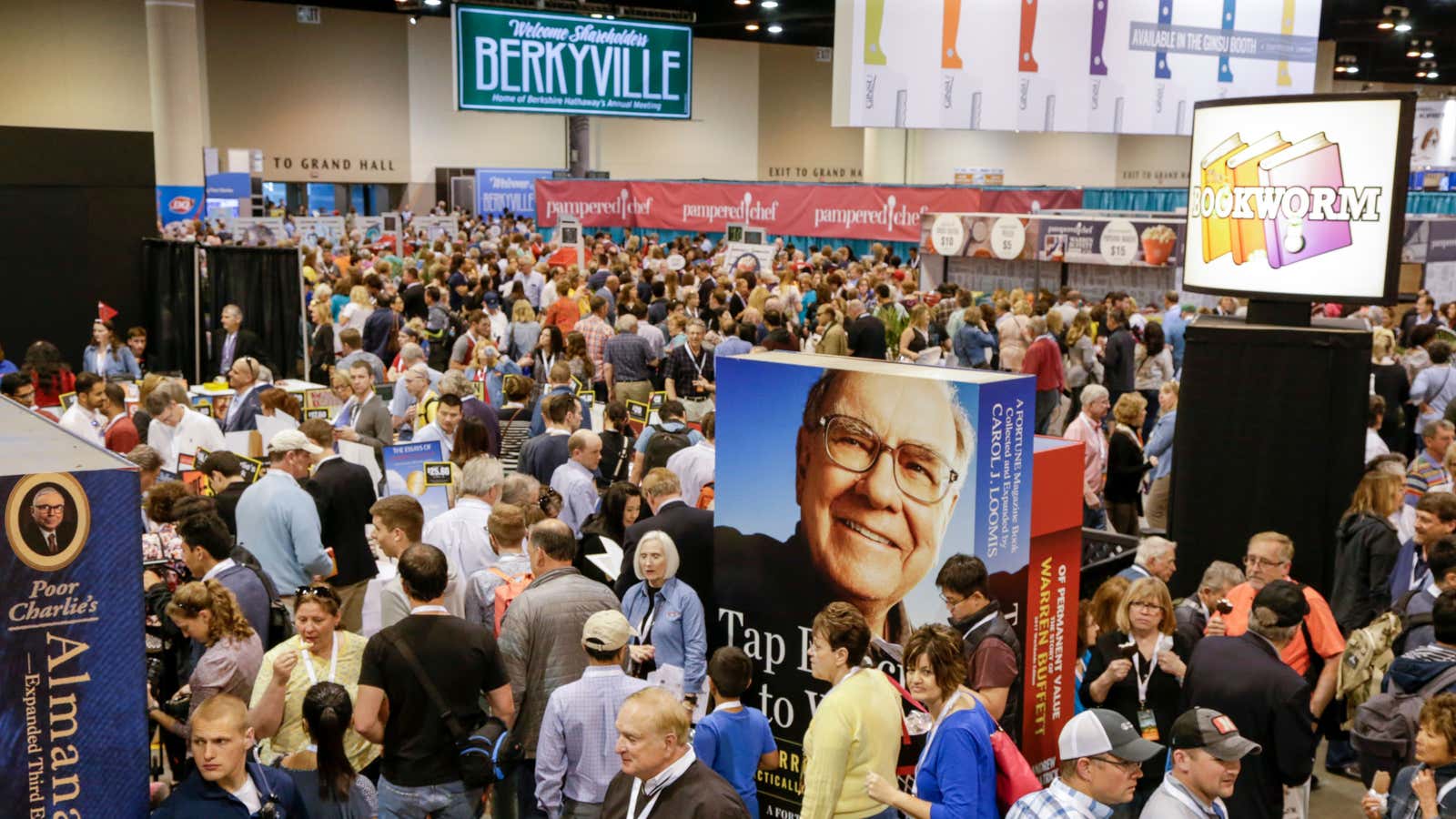Centuries from now, historians piecing together the narrative of this stretch of America’s existence will have to explain the curious four-decade (and counting) run in which an arena in an otherwise modest midwestern US city filled to capacity once a year for two aging billionaires talking about the stock market, life, and whatever else tickled their fancy.
The annual meeting of the Omaha, Nebraska-based holding company Berkshire Hathaway has no analog in US business or culture.
Announcements for the typical corporate annual meeting go straight into most shareholders’ recycling bins. But for Berkshire Hathaway’s, people fly in from Shanghai, Cape Town, and New York City; they drive in from all corners of the US. They bring their babies, their parents, their neighbors, their friends. They are professional asset managers for whom the long weekend is a four-day sprint of deals and networking, and semi-retired Omahans whose grandparents entrusted their money back in the 1960s to a bright young local fund manager named Warren Buffett and as a result made their descendants extremely rich.
The formal business of the annual meeting takes less than an hour, but nobody comes all that way to watch Buffett call for approval of last year’s minutes. They come for many reasons, not the least of which is to see Berkshire’s chairman and CEO hold court with vice chairman Charlie Munger on the floor of Omaha’s CenturyLink Center. Fortified by Cherry Coke, boxes of See’s peanut brittle (both Berkshire holdings), and preternatural mental stamina and agility, Buffett and Munger review the year’s performance and then open the floor to questions. Alternating between queries from financial journalists, analysts, and shareholders, the two speak off the cuff for six hours on everything from oil to politics to life advice. Audience members decades younger leave the arena for snacks and bathroom trips; Buffett and Munger never do. (There is, however, a one-hour lunch break.)
Buffett is 87. Munger is 94. And Berkshire Hathaway’s returns over the S&P 500 are slowing, as Buffett has warned for decades they would. Yet shareholder meeting attendance continues to grow. Twenty-odd people attended the first Omaha confab, which was held in an insurance company’s cafeteria. By 1998, there were 10,000 attendees. This year, more than 40,000 people have come to Omaha for the meeting weekend, as they have every year since 2015.
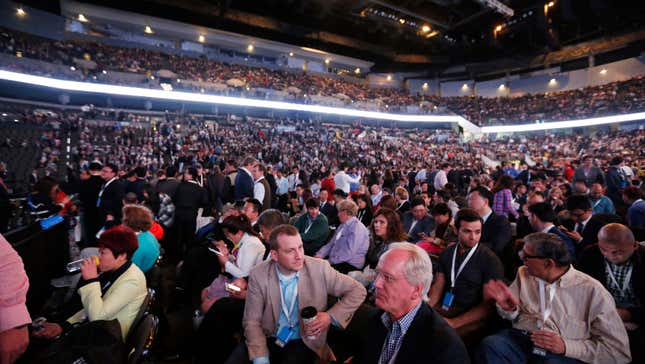
People come because they always have, or because they never have, and because there is an urgent sense of an era drawing to its close.
It’s not only the advancing ages of the two men on stage. It’s the sense of irreproducibility in the whole enterprise: Berkshire’s returns as a company, Buffett’s skill as a manager, the idea that it’s possible to prosper without breaking anything or anybody.
Buffett did not invent anything new or disrupt anything old. Berkshire Hathaway is nothing more than a collection of successful businesses started and managed by other people, a portfolio that Buffett assembled using a set of principles he has stuck to doggedly, with mostly spectacular results.
He built his empire without the trail of vengeful enemies and upended industries that other titans leave in their wake. And he did so while insisting on honesty (but not moral perfection) from his managers and employees, while also acknowledging his privilege as a white American man born when he was, and while pointing out the ways in which the country impoverished itself by holding back women.
He is private about the stocks he’s thinking of buying or selling, but public with the deceptively simple precepts that govern his decisions: Don’t buy things you don’t understand; don’t speculate or day-trade; don’t squander reputation for money. For decades he has personified America’s dearly held belief that people can become rich because they are honest and ethically upright, and not just despite it. In Omaha, amid tens of thousands of his most fervent believers, it’s possible to get a sense of how enduring this faith might be.
Thursday
The cult of Buffett is a testament to the uniquely American ability to look at a person who alone possesses more wealth than the entire nation of Uruguay and see an Everyman. Countless books and articles fetishize his work habits, his reading list, the aggressive modesty of his lifestyle relative to his net worth. He drives himself to work, breakfasts at McDonald’s, and has lived in the same house since 1958—a 6,750 square-foot house, yes, but in Omaha, a midwestern US city as far from either elitist coast as it is possible to be. From 2011 to 2014, the US network The Hub showed a children’s cartoon called “Warren Buffett’s Secret Millionaire’s Club,” in which an animated Buffett dispensed wisdom to plucky kids about hard work, honesty, and sound business practices.
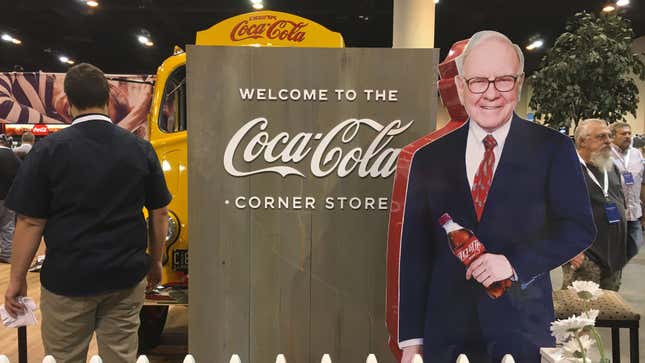
His fans are legion, and surprising. In his 2017 book On Power: My Journey Through the Corridors of Power and How You Can Get More Power, Kiss singer Gene Simmons praised Buffett as “one of the few mega-billionaires with a reputation for his absolutely fair, compassionate and by-the-books practices.” (Easy to admire, but harder to emulate: Simmons was reportedly banned from the Fox network for screaming “Hey chicks, sue me!” while baring his chest at female staff during a promotional appearance for the book.)
The original Berkshire Hathaway was a textile mill in New Bedford, Massachusetts. Buffett took control of the company in 1964 and began using it as a vehicle to make other purchases: the Buffalo News, Geico insurance, Dairy Queen, Duracell. A $1,000 investment in Berkshire Hathaway in 1964, the year Berkshire went public, is worth $16 million today.
Buffett is the leading figure of a school known as value investing. First outlined by Buffett’s mentor and Columbia Business School teacher Ben Graham, value investing is predicated on the idea that the average investor’s best bet is to look for profitable, well-run companies trading at a good price, buy their stock, and hold onto it for as long as possible.
The term “value investing” is a little fuzzy—“I have never met a manager who says, ‘I invest in overvalued companies that destroy shareholder value,’” one asset manager grumbled when asked to define it.
Value investing doesn’t demand an advanced math degree, creative deployment of flash trading, dark pools, or credit default swaps, nor a trust fund-sized pool of starter capital. It’s serviceable shorthand for Buffett’s approach to money: do your homework; think long term; choose rationality over emotional sway; read and learn absolutely everything you can, because knowledge compounds just like money does.
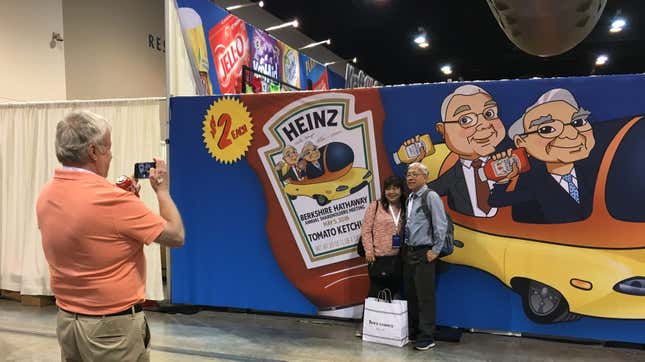
For people who get absolutely psyched about discounted cash flow analysis, the Berkshire annual meeting is a combination of conference, reunion, and spiritual retreat. Budding entrepreneurs and young professionals with C-suite aspirations have a constantly rotating cast of idols to emulate. But for people who manage money for a living, no one has superseded Buffett in either performance or ability to articulate a philosophy on life and investing.
Kokkie Kooyman started reading about Buffett in the late 1980s, as it became clear that his home country of South Africa would need to design a post-apartheid financial system. He flew to his first annual meeting in 2000. He has returned every year since, with an entourage of clients and colleagues that now numbers around 40 people per trip, despite the 25-hour minimum journey from Cape Town to Omaha.
“The whole thing is a cosmos on its own in its way,” said Kooyman, now a portfolio manager at the asset management firm Denker Capital. “You’ve almost got to come here just to realize what Warren Buffett is about. This is still a conservative Midwestern town, and this is where he’s comfortable.”
The city itself is part of Buffett’s legend, especially for admirers from larger, more globally connected hubs. (The first-ever international flight from Omaha’s Epply Airfield took off on May 1, a direct service to Toronto.) Greater metropolitan Omaha has 1 million people and one of the highest per capita concentrations of five Fortune 500 companies in the US. Nonetheless, some out-of-towners will speak of Buffett as though he were running an empire from a log cabin off the grid.
Kooyman sees Omaha as an extension of Buffett’s transparency. “He is what he is,” Kooyman said. “He’s consistent within himself. He’s not bullshitting and trying to play this simple guy when he’s not a simple guy. Just now I was in the hotel and CNBC was on. You listen to all the noise and the rubbish that’s just going nonstop—and people sit and listen to this and make decisions on it! Berkshire Hathaway is a totally different world. It’s like a different planet.”
An anthology of essays from longtime meeting attendees, published a few weeks before this year’s gathering, reads like the memoirs of religious sect adherents. The writer Randy Cepuch called a chance run-in with Buffett “the equivalent of running into a famous guru at the base camp on the night before you plan to climb the mountain he’s supposed to be atop.” More than one writer compared their relationship with Omaha to the Jewish people’s devotion to Israel.
“I write down notes, I laugh, I rummage around the Convention area and eat Dilly Bars and See’s Candy, I return to the meeting and learn some more,” wrote Shane Parrish in an account of his meeting routine posted on his blog Farnam Street, named for the Omaha thoroughfare where Berkshire Hathaway’s offices are located. “At some point, the day is up and it feels like we’ve barely scratched the surface. What about last year’s unusually high amortization charge?”
Six years ago, Les Baquiran attended his first meeting with his mother, a Berkshire shareholder. Then a principal at Blackstone, “I was so inspired I literally quit the next day,” he said. He went on to found Alpine Capital, an asset management firm.
“It’s a great entrepreneurial American story. It’s just inspiring. It reminded me of own parents, who emigrated from Asia and started their own business. It’s an amazing story of America. Nice guys don’t always finish last.”
Friday
The statues on CenturyLink Center’s plaza look eerily like those street performers who pretend to be statues at tourist sites. The day before the meeting, three parents were wrangling a gaggle of tired and hungry children, ages four through eight, into reluctant poses with the sculptures.
Originally from China, both families now live in Winnipeg, Canada, and had brought the kids down to see Buffett up close. “The little kids, they can learn something about investing and money management. Open their eyes, give them more knowledge,” said Peter Li, a shareholder who works for a Shanghai-based asset management fund. “In China, Warren Buffett is famous. They say he’s the god of the stock market. His approach is very good. We try to follow his advice. It’s the best way to make money in the stock market.” Asked what she thought about the experience, his friend’s four-year-old daughter smiled and licked the lamppost.
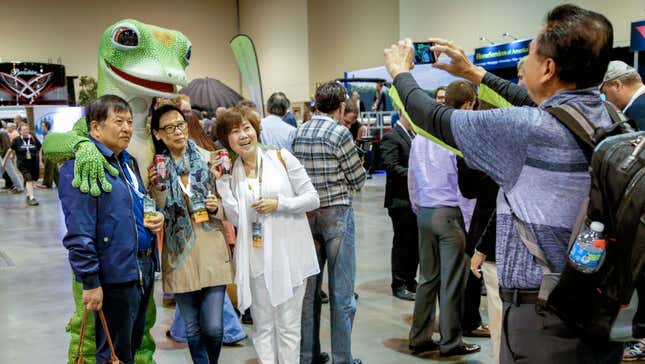
Buffett has long been famous in China, where his face adorns Cherry Coke cans. Local interest in the shareholder meeting has skyrocketed of late. Roughly 10% of meeting attendees in 2016 and 2017 were from China, according to Charlie Tian, founder of the investing website GuruFocus, up from virtually none 20 years ago. Chinese is the only language for which Yahoo provides official translation on its live feed of the meeting, which reached 3.1 million people last year.
In 2017, The Economist said that Buffett had many fans in China but few true followers, arguing that he’s admired more for his sheer net worth than his strategy of investing in stable companies. Buffett does indeed have many admirers in China and elsewhere exclusively for his wealth: “Money, money, money!” a financial planner from India shouted when asked what drew him to the Berkshire meeting. But there are signs that the same principles that originally excited US investors hold sway for those who made longer journeys to get to Omaha.
In 1994, Buffett suggested that Berkshire Hathaway companies set up booths in the lobby of the Orpheum Theater so that the 2,700 attending shareholders that year could shop during breaks. By 2015, the number of vendors and attendees had grown to the point that meeting-day shopping was an untenable madhouse. The shopping pavilion now gets a bonus day before the main event.
Thanks to heavy discounts, Shareholder Shopping Day is a kind of Black Friday for anyone within a day’s drive of Omaha and with access to a friend or relative with a shareholder pass. Every Berkshire shareholder is entitled to four meeting passes, so getting hold of one is not too hard. If you haven’t picked up your pass yet, or don’t have one, or are in a small tiff with your traveling partner over which one of you was supposed to get the passes, chances are you will meet someone in Omaha who will kindly hand over an extra. It’s like the capitalist version of “miracle” tickets at Grateful Dead shows.
An hour before the doors opened at noon, the line of people in the casual clothes and comfortable shoes one wears for a day at a theme park stretched up South 10th Street. Some had already made stops at the Omaha outposts of Borsheims, a Berkshire-owned jeweler, and Nebraska Furniture Mart, a Berkshire-owned furniture store that last year sold $44.6 million in merchandise during meeting week. One man said his entire house is furnished with pieces bought at discount on shareholder weekends.
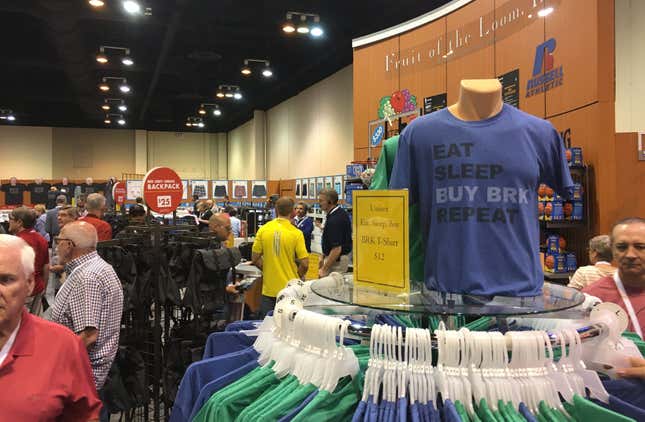
Shareholder Shopping Day early birds are an exceptionally practical bunch. On one point, the line was in near-perfect agreement: You’re a fool if you don’t go straight to the Fruit of the Loom kiosk, followed by the Pampered Chef. One or two people preferred to go to Pampered Chef first, then Fruit of the Loom, but anyone who might squander precious time somewhere like Garanimals or Coca-Cola Corner needs to get their head together.
Fruit of the Loom, line members explained, has deep discounts on regular things like underwear and unparalleled selection of special things one can only buy at a Berkshire annual meeting, like T-shirts that say “The Next Warren Buffett” or cotton lounge pants imprinted with Munger’s face. Many people in line were in fact wearing such clothes right at that moment. Some shoppers run in and buy a year’s supply of underwear for their entire family and just clean the whole place right out so, yeah, getting there early is kind of a big deal.
Buffett’s “circle of competence,” the phrase he uses to describe investors’ areas of expertise, centers around insurance (Geico, National Indemnity Company) and consumer products that provide modest lifestyle upgrades to American families. Vendors include H. H. Brown Shoe Co., maker of sensible brands like Børn and Nurse Mates; Benjamin Moore paint; Wayne Pumps, whose ad copy promises “Never Worry About your Basement Again”; DynaMax RVs; South Bay Pontoon pleasure craft; Ginsu knives; and World Book encyclopedias.
The only non-Berkshire vendor in the hall is Bookworm, Omaha’s independent bookstore, which offers a shareholder meeting catalogue Buffett personally curates each year. Amid copies of Graham’s The Intelligent Investor and Phil Knight’s memoir Shoe Dog was a stack of The Oracle’s Fables, a self-published book of Aesop-style tales for children inspired by Buffett aphorisms. In “The Mice, the Beaver, and Old Man Winter,” a pack of mice reject a beaver’s offer to build a nice wood bridge in exchange for corn and take a counteroffer from Old Man Winter, who offers an ice bridge for free. Spoilers: Spring comes; the mice have regrets. At the bottom of the tale is Buffett’s frequent admonition: “Price is what you pay, value is what you get.”
The cavernous ceiling and motley assortment of products and services made the hall feel like a cross between Costco (in which Munger owns a minority stake) and a theme park where the mascots are two elderly men. Munger and Buffett’s faces were everywhere: emblazoned on the side of commemorative Heinz mustard and ketchup bottles, in a cartoon at the BNSF railroad display, on cardboard mannequins wearing T-shirts from Fruit of the Loom, which was indeed velvet-roped off into its own corner and guarded by a broad-shouldered bouncer.
“You learn a lot the day of the meeting just through osmosis,” said Tom from Wisconsin as he waited in the Fruit of the Loom line. He tapped a point on his skull just over his ear to show where the wisdom gets in. “Even if you’re not listening, it’s coming into your mind and your subconscious is getting the thoughts. So maybe a year down the line, something pops into your head that you heard and it solves a problem or a challenge that you got.”
Tom used to run accounting for his family’s orthopedic shoe company. When they sold the business, he applied to a retail financial services firm but was told he didn’t have the “right temperament.” Instead, he read Buffett and started investing for himself. He sets his own hours, lives where he likes, and does well enough to pepper the term “lake house” throughout his speech. No one gets to tell him his temperament isn’t right.
“When you come back here every year, it’s like you’re resetting your gyroscope into the proper frame,” he said of his annual pilgrimages to Omaha. “It’s like you’re getting in sync again. And it’s a place where you come once a year, and it’s always the same place. It’s not like, we’re gonna have it in Omaha this year, we’re gonna have it in Fort Worth, Texas, next year. It’s always here. You get to know things. It’s just like a second home on the lake or something. That kind of feel.”
Many shareholders described a similar ritualistic approach to their annual Omaha trek: the same restaurants, the same hotel, the same friends. It’s a lot like going to church, which for many Americans is also a once- or twice-a year experience—and no matter how long you’ve been away, the rhythm of the service doesn’t change.
Saturday
At 6:02 am there were lines hundreds of people deep at each of the arena’s four entrances. “I got here at 3 am,” said a cheerful woman in a CenturyLink Center fleece. “There were a couple of people waiting for me, but thankfully I don’t think anybody slept here.”
She was only partially right.
Yue Pan, a 33-year-old corporate finance worker from Beijing, had been at the center since midnight and hadn’t slept at all. Unlike the groggy professional line sitters a few feet back, Pan looked as fresh as if she’d stepped out of an executive suite.
Her explanation for being there was simple: Buffett is the best investor on earth, and Pan wants her investments to do well, so here she is at dawn on a sidewalk 6,500 miles from home. The trip could not be postponed: “He’s getting older and older. With all due respect, we don’t want to miss any possible opportunities to see him and hear advice and tips from him.”
Pan—like the stock photographer from Cologne a few people behind her, and the self-employed investor from Patterson, Louisiana, a few people behind him—is seeking financial independence. That is also the goal of TeamGetMoney.net, a personal finance website started in 2015 by Joshua Jones of Scott, Louisiana.
“I have every single video of Warren Buffett on my phone. I don’t listen to music. I listen to Warren Buffett.” He pulled out his phone and swiped through what seemed like an endless stockpile of Buffett clips: Buffett on CSPAN, Buffett on CNBC, aging as he went.
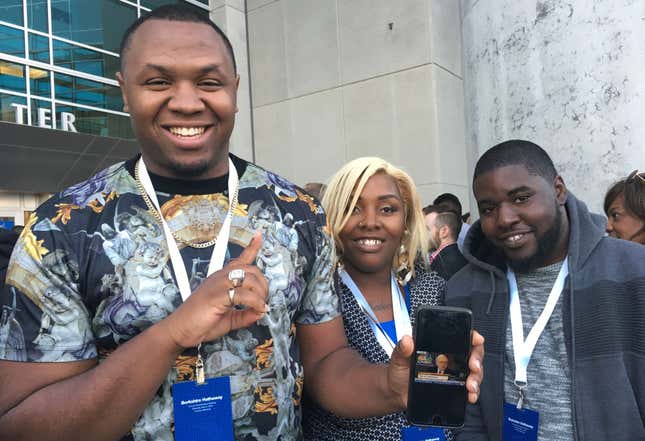
“He’s very humble,” said Jones, 25. “He’s very intelligent. He’s not boastful. He can speak to people on a normal level. I truly believe that’s a gift of his. It’s a good trait.” It’s one that Jones aspires to on his own blog, in which he lays out his personal journey from broke person to not-broke person in language accessible to readers new to personal finance.
Asked how it felt to be so close to his role model, Jones paused. His eyes welled. He accepted a tissue. He took a deep breath but the welling just got worse. He dropped his face into his hands. And then the doors to the meeting opened. He gasped, and was gone.
CenturyLink Center has almost 19,000 seats. Every one of them appeared full by the time the lights dimmed.
“I don’t want to miss that electric moment when Warren and Charlie take the stage,” asset manager Robert Hagstrom wrote about why he’ll never skip a meeting while Buffett and Munger are alive. “The closest I can come to explaining the feeling is to ask what is the difference between watching a dated concert on television and being there live when those lights come up on world-famous rock stars.”
Actual rock stars take the stage to screams and fireworks. Buffett and Munger got a lot of polite applause and a few woos. They took their seats, and Buffett welcomed his audience with a quip many of them have doubtlessly heard countless times before: “I’m Warren, he’s Charlie.”
The next six hours passed in the kind of atmosphere where a man can step up to a microphone and say, “I’m an infertility doctor from St. Louis, I’ve been a shareholder and coming to this meeting for 23 years, and I want to thank you for making my grandchildren very rich,” and a full arena applauds.
The performance went exactly as everyone said it would: Audience members and a pre-selected panel of journalists and analysts lob questions; Buffett answers, and Munger chimes in when moved; they eat a ton of peanut brittle. What Buffett and Munger say during the meetings is actually not all that important. Virtually all of it they have said in public before; virtually all of it will be reported on ad nauseum.
What is noteworthy is that they listened to each question and answered with respect uncolored by condescension. At one point an 8-year-old girl named Daphne got up to ask why Berkshire seemed to be trending away from investments in capital-efficient businesses in favor of capital-intensive ones like railroads (she was reading from a printed statement). Buffett said with a chuckle, “You’re killing me, Daphne,” and explained that Berkshire focuses less on the capital required to run a business than the returns that business produces. Munger did not pull punches.
“That young lady . . . basically wants her royalty on the other fellow’s sales. And of course that’s a very good model, and if everybody could do that, why, nobody would do anything else,” he said.
In his 1983 annual letter to shareholders, Buffett outlined a set of now-famous principles by which he and Munger would run Berkshire. “Charlie Munger and I think of our shareholders as owner-partners, and of ourselves as managing partners,” Buffett wrote. Such a statement could read like corporate pandering, if it wasn’t followed a few paragraphs later with this:
We will be candid in our reporting to you, emphasizing the pluses and minuses important in appraising business value. Our guideline is to tell you the business facts that we would want to know if our positions were reversed. We owe you no less. Moreover, as a company with a major communications business, it would be inexcusable for us to apply lesser standards of accuracy, balance and incisiveness when reporting on ourselves than we would expect our news people to apply when reporting on others. We also believe candor benefits us as managers: the CEO who misleads others in public may eventually mislead himself in private.
To Buffett and Munger’s credit, it’s a pledge they have consistently delivered on, even if some of their holdings have not. It’s a very different stance toward investors than the one taken by, say, Elon Musk, who in a Tesla earnings call days before the Berkshire meeting snapped at analysts who dared to ask how the electric-car maker managed to burn through yet another billion dollars.
In finance, an industry that seems at times deliberately opaque, Buffett has made a studious effort, especially in his later years, to translate his teachings into the vernacular. Several observers have commented that Buffett is in “legacy-building mode.” For someone who has resisted putting his names on buildings or endowing chairs, Buffett’s greatest non-monetary bequest will be the massive archive of Berkshire meeting transcripts, shareholder letters, and various essays and interviews. It’s a gift already accessible to anyone with an internet connection and a desire to learn, with no physical tether to Omaha, the US, or any other single location.
“I’m bullish on the future of the United States, but I’m bullish on the future of China and to a significant extent the rest of the world,” Buffett said near the end of this year’s meeting. “People are going to be living better 10 and 20 years from now, and I can’t think that can be stopped—barring weapons of mass destruction.”
After
Berkshire Hathaway will go on after Buffett and Munger exit the stage. In January, Buffett promoted respected Berkshire executives Ajit Jain and Gregory Abel to the roles of vice chairmen, the same title Munger currently holds, with the strong suggestion that one of the men will succeed Buffett eventually as chair.
But the annual meeting in its current form will cease to exist. Conscientious investors will still read their annual reports, but no one is going to line up to get their photo taken with a cardboard cutout of Jain holding a bottle of Coke. No one is going to burst into tears when asked what Abel means to them.
It’s also hard to say at this point if America will continue to be as safe a bet as Buffett has long insisted it is. Yes, as he has often pointed out, the US has weathered civil war and presidential assassinations, global conflict and cultural schisms, and has continued to prosper. But Buffett, born a middle-class white American male in 1930, was perfectly positioned to ride a wave of economic and consumer growth unlike any seen before it. For all the social barriers that have fallen in Buffett’s lifetime, income inequality has only increased. For many, the American dream that Buffett personifies feels more elusive than ever.
Perhaps what’s most intriguing is that while Buffett has always seen his success as a product of America, a lucky draw in what he terms the “ovarian lottery,” few of his global followers hold the same view. The upside of America no longer having a lock on the American dream is that it just becomes a dream, one theoretically accessible to anyone.
Maybe Berkshire without its charismatic frontman will become just another faceless corporation. Or maybe Berkshire after Buffett will be like the Grateful Dead after Jerry Garcia—some fans will drift away, but the community of people drawn to the ethos will remain. The show will go on, enriched by the stories of old-timers only too happy to recount what it was like back in the day, when the man himself was still around.
